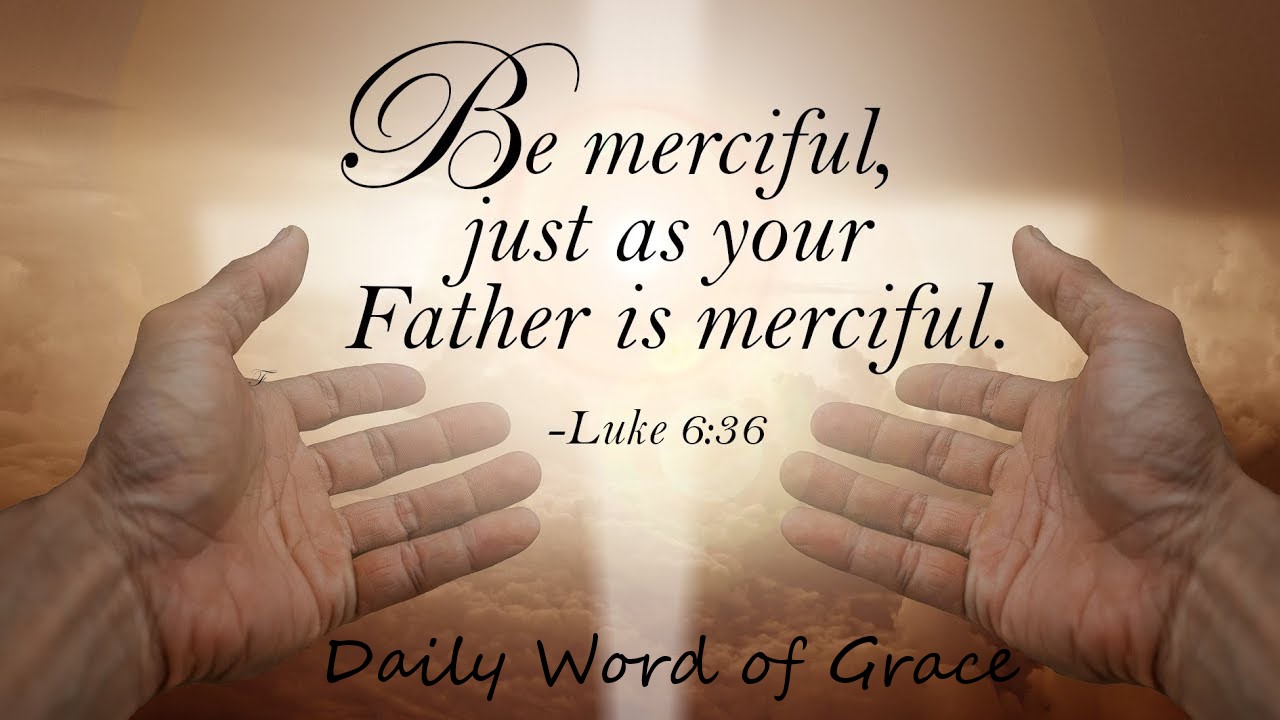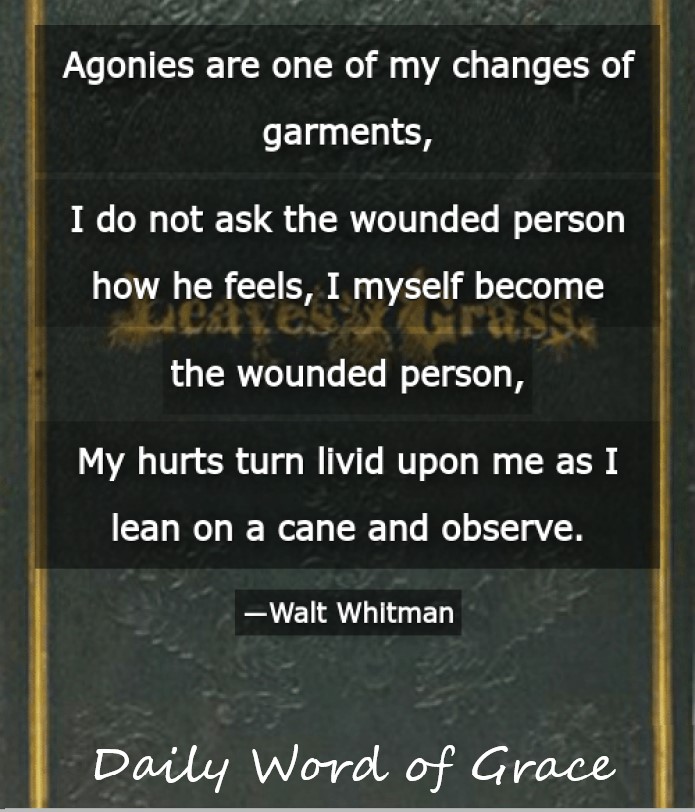Daily Word of Grace for July 2020. Current postings of Daily Word of Grace can be found at the upper level of the page.

Ever since Tom Petty’s hit “The Waiting” was released in the spring of 1981, when I was in sixth grade, it has been my favorite of his songs. It not only has a catchy and memorable hook but also a recurring phrase to which all of us can relate: “the waiting is the hardest part….the waiting is the hardest part.” So true, isn’t it? I will confess that waiting has never been a strength of mine, but I am not alone. We do not like to wait in line, or wait in a doctor’s office, or wait on hold on our phones (especially when subjected to painfully bad “waiting” music), or wait for someone to text us back a simple answer to a simple question. As human beings things are never done fast enough—and although our technology has advanced and we are able to complete transactions and other things so much faster than before, we still do not like to wait. And yet scripture often calls us to “wait for the Lord” to do for us what we cannot do for ourselves. The psalmist wrote, “Wait for the Lord; be strong, and let your heart take courage; wait for the Lord” (Psalm 27:14), and as the prophet Isaiah put it this way, “those who wait for the Lord shall renew their strength, they shall mount up with wings like eagles, they shall run and not be weary, they shall walk and not faint” (Isaiah 40:31). And what happens when we wait for the Lord? The Lord always comes through, even if it’s not on our little timetable, so that eventually we can echo the psalmist, “I waited patiently for the Lord; he inclined to me and heard my cry” (Psalm 40:1).
Love and Prayers,
Dave
One of the most beautiful (and relatable) collects in The Book of Common Prayer is this: “O God, whose glory it is always to have mercy: Be gracious to all who have gone astray from your ways, and bring them again with penitent hearts and steadfast faith to embrace and hold fast the unchangeable truth of your Word, Jesus Christ your Son; who with you and Holy Spirit lives and reigns, one God, for ever and ever. Amen” (218). God is a merciful God, thankfully, always and forever. Scripture assures us God’s mercies “never come to an end; they are new every morning” (Lamentations 3:22-23) and that our Savior Jesus Christ remains our “merciful and faithful high priest” (Hebrews 2:17). Moreover, in The Prayer of Humble Access we are reminded that God is indeed “the same Lord whose property is always to have mercy” (BCP 337), and similarly in the collect at one’s burial we pray to “God, whose mercies cannot be numbered” (BCP 470). This is good news because “all who have gone astray from your ways” includes each one of us, no exceptions (Isaiah 53:6), and yet God’s glory still remains “always to have mercy.” In other words, God’s final word is a word of mercy. And in response to God’s mercy we are called to follow suit, as Jesus taught, “Be merciful, just as your Father is merciful” (Luke 6:36).
Love and Prayers,
Dave


One of the best known poems of the nineteenth century American poet Walt Whitman (1819-1892) is entitled “Song of Myself.” It is divided into fifty-two sections (perhaps to match the fifty-two weeks of a year) and throughout the poem Whitman identifies himself with the various aspects of the highs and lows of the human condition. In the thirty-third section he identifies with human suffering: “Agonies are one of my changes of garments, I do not ask the wounded person how he feels, I myself become the wounded person, my hurts turn livid upon me as I lean on a cane and observe” (Leaves of Grass, Modern Library edition, 85). In his incarnation, passion, and death Jesus did not ask us how we feel, Jesus became “the wounded person” for all of us, including you. The Old Testament prophet Isaiah prophesied about this seven centuries earlier: “Surely he has borne our infirmities and carried our diseases; yet we accounted him stricken, struck down by God, and afflicted. But he was wounded for our transgressions, crushed for our iniquities; upon him was the punishment that made us whole, and by his bruises we are healed” (Isaiah 53:4-5). On the cross Jesus’ hurts turned livid as he hung on the cross, but he endured all that anyway because he loved us that much…and still does.
Love and Prayers,
Dave
On their 1992 album Automatic for the People REM has a comforting song called “Everybody Hurts” that goes right to the heart. Lead singer Michael Stipe sings, “When your day is long and the night, the night is yours alone. When you’re sure you’ve had enough of this life, well hang on. Don’t let yourself go, ‘cause everybody cries and everybody hurts sometimes. Sometimes everything is wrong. Now it’s time to sing along. When your day is night alone, hold on, hold on. If you feel like letting go, hold on. If you think you’ve had too much of this life, well, hang on…you’re not alone.” Even though we are all aware that we are not alone dealing with the innumerable stressors of this pandemic, it can still feel that way. Hurt has a way of leaving people feeling isolated, alone—as Roy Orbison similarly sang in his 1960 hit “Only the Lonely”—“only the lonely know the way I feel tonight.” Both these songs remind us that although hurt leaves us feeling alone and lonely and wondering if anybody else on the planet truly understands what we’re going through, we are indeed not alone because everybody hurts. In his incarnation and earthly life Jesus Christ the Son of God, took our humanity upon himself (Philippians 2:6-7) and experienced not only the joys of our lives but also the hurts—even to the point of suffering and dying alone on a cross. And even now the Risen Jesus bears the scars to remind us that God understands that everybody hurts and that we are never ever alone—and regardless of our ability to “hang on”, God hangs onto us as well.
Love and Prayers,
Dave


In his moving and evocative 2007 book Love is a Mix Tape: Life and Loss, One Song at a Time Rob Sheffield writes about the tragic unexpected death of his wife Renee. They had been married five years when she died of a pulmonary embolism. Their mutual love of music had brought them together in the first place, and throughout their relationship they made mix tapes for one another—each cassette tape containing songs that resonated with them. In the aftermath of Renee’s death Rob, in the midst of his unspeakable grief, received many acts of kindness as unexpected as her death: “People kept showing me unreasonable kindness, inexplicable kindness, indefensible kindness. People were kind when they knew that nobody would ever notice, much less praise them for it. People were even kind when they knew I wouldn’t appreciate it” (164-165). There is a word for that type of kindness, a word for “unreasonable kindness, inexplicable kindness, indefensible kindness” that has nothing to do with being noticed or praised or appreciated: grace. And grace is what God gives each and every one of us (“grace upon grace”—John 1:16) each and every day, regardless of how hard life gets, regardless of what song is playing on our mixtape. And it is God’s grace, God’s unexpected kindness, that turns our hearts back to God (Romans 2:4).
Love and Prayers,
Dave
Daily Word of Grace # 94 (July 24, 2020)
Many consider James Joyce’s 1922 novel Ulysses as one of the greatest novels of the twentieth century. It is a brilliant though difficult book for sure, but full of insights into the human condition, like this one: “There are sins or (let us call them as the world calls them) evil memories which are hidden away by man in the darkest places of the heart but they abide there and wait. He may suffer their memory to grow dim, let them be as though they had not been and all but persuade himself that they were not or at least were otherwise. Yet a chance word will call them forth suddenly and they will rise up to confront him in the most various circumstances, a vision or a dream, or while timbrel and harp soothe his sense or amid the cool silver tranquility of the evening or at the feast at midnight when he is now filled with wine” (Modern Library edition 421). Who among us has not experienced that? Such sins or “evil memories” may involve things we have done or things others did to us—but either way, in spite of all our efforts to reach “closure” and “move on” they remain “in the darkest places of the heart.” And yet, none of it is beyond the mercy of God, whose “mercies never come to an end; they are new every morning” (Lamentations 3:22-23). So the next time “a chance word” calls these things forth to confront you, remember that God has already covered it with mercy.
Love and Prayers,
Dave


Daily Word of Grace # 93 (July 23, 2020)
The moving Broadway musical Hamilton is about Alexander Hamilton (1755-1804). It includes a song called “Unimaginable” that is sung late in the play after Alexander Hamilton has been found out about his extramarital affair and after the death of his son Philip, who died in a duel just as Alexander himself would a few years later. This painful season endured by Alexander and his longsuffering wife Eliza is described: “There are moments that the words don’t reach. There is suffering too terrible to name. You hold your child as tight as you can and push away the unimaginable. The moments when you’re in so deep it feels easier to just swim down. The Hamilton’s move uptown and learn to live with the unimaginable.” And yet as awful as that season was for Alexander and Eliza, ultimately grace still won the day: “There is a grace too powerful to name. We push away what we can never understand. We push away the unimaginable. They are standing in the garden, Alexander by Eliza’s side. She takes his hand. It’s quiet uptown.” Odds are in your life you too have weathered “the unimaginable” in one way or another. And yet, that is where the grace of God wins the day: “where sin increased, grace abounded all the more” (Romans 5:20). Out of grace toward you on Good Friday Jesus endured unimaginable suffering, “suffering too terrible to name”, and even now the Risen Jesus comes along side you in the garden and quietly takes your hand to offer grace that is even more unimaginable.
Love and Prayers,
Dave
Daily Word of Grace # 92 (July 22, 2020)
One of the best known Romantic poets is William Blake (1757-1827). In his poem “To Nobodaddy” he described love this way: “Love to faults is always blind, Always is to joy inclined, Lawless, wing’d & unconfin’d, And breaks all chains from every mind.” While Blake’s religious views are nebulous, perhaps like yours, this poem mirrors God’s love for you. God’s love indeed “to faults is always blind” for God casts all your sins “into the depths of the sea” (Micah 7:19) and “covers a multitude of sins” (1 Peter 4:8). God’s love indeed is “always to joy inclined”, as Jesus said at the Last Supper, “Abide in my love…that your joy may be complete” (John 15:9, 11). And yes, indeed God’s love is “lawless, wing’d & unconfin’d” because God’s love fulfills the law (Romans 13:10), because the “wing’d” Holy Spirit assures you of God’s love (Galatians 4:6-7), because God’s “unconfin’d” love defies all measurement (Ephesians 3:19). And yes, indeed God’s love “breaks all chains from every mind” because Jesus came to set the captives free (Luke 4:18) and proclaimed, “If the Son makes you free, you will be free indeed” (John 8:36). This may all sound too good to be true, but it is true; it is the gospel of God’s unconditional love for all, including you.
Love and Prayers,
Dave


Daily Word of Grace # 91 (July 21, 2020)
One of the greatest double albums in rock history is the 1973 album Quadrophenia by The Who. The album recounts the search for meaning by an adolescent named Jimmy. At the root of his struggles is the desire to be really known and really loved. In the song “The Real Me” Jimmy seeks help from a doctor, a preacher and his mother, but unfortunately does not receive what he is looking for—as the song ends with Jimmy asking, “Can you see the real me, preacher? Can you see the real me, doctor? Can you see the real me, mother? Can you see the real me?” Of course Jimmy is not alone, not by a long shot. Each one of us embarks on our own searches for meaning, and each one of us also has the desire to be really known and really loved. The good news of the gospel is that God is the one who searches you out, as Jesus said, “The Son of man came to seek out and to save the lost” (Luke 19:10). Moreover, the good news of the gospel is that you are indeed really known and really loved by God, whose love for you is so great it “surpasses knowledge” (Ephesians 3:19). In other words, God’s answer to your question, “Can you see the real me?” is a resounding “Yes”, accompanied by equally resounding love.
Love and Prayers,
Dave
Daily Word of Grace # 90 (July 20, 2020)
Between graduating from college and beginning parish ministry I worked as a bank teller for several months in Alexandria, Virginia. I learned very quickly that people are passionate about their money, and want to make sure their deposits are entered into the right account, understandably so. The vast majority of customers were immigrants from other countries and spoke very little English, but fortunately the head teller spoke several languages. She bailed me out many times when I could not understand what a customer was asking. In his Letter to the Romans Paul describes God’s righteousness as being “reckoned” to us through faith, citing the Old Testament patriarch Abraham as an example: “his faith ‘was reckoned to him as righteousness.’ Now the words, ‘it was reckoned to him,’ were written not for his sake alone, but for ours also. It will be reckoned to us who believe in him who raised Jesus our Lord from the dead, who was handed over to death for our trespasses and was raised for our justification” (Romans 4:22-25). The word “reckon” is an accounting term and means “to credit to your account.” In other words, through faith (or trust) in Jesus our Lord we are not only forgiven of our sins, but God’s righteousness is also credited to our account. In other words, if God sent you a bill for your sins (scary thought), it would read, “Amount owed: $0.00…Minimum payment due: $0.00.” God’s grace has already been deposited into your account.
Love and Prayers,
Dave


Daily Word of Grace # 89 (July 17, 2020)
In a particularly high octane gospel parable, the Parable of the Prodigal Son (Luke 15:11-32), Jesus recounts the story of a wealthy man who had two sons: the dutiful firstborn and his slacker younger brother. In a moment of unimaginable selfishness the younger son asks his father for his part of the inheritance now, the equivalent of telling his father he wished he were dead. And yet the father gives him his share of the inheritance with no questions asked, no catch, no disclaimers. The younger son goes to a foreign land and “squandered his property in dissolute living,” wasted every cent on his selfish pleasures. The younger brother becomes so desperate he takes a job feeding pigs, which is as low as it gets for a privileged Jewish son who would have never even been allowed to eat pork. At the turning point of the story the younger brother “came to himself” and decided to return home and tell his father his prepared speech, “Father, I have sinned against heaven and before you; I am no longer worthy to be called your son; treat me like one of your hired hands.” And yet “while he was still far off, his father saw him and was filled with compassion ; he ran and put his arms around him and kissed him.” After the younger son gave his prepared speech, his father showed unbelievable grace and began giving orders to throw a party to end all parties because his lost son was finally safely back home. At the party the father gave his son a robe which was typically given to the guest of honor, a ring which symbolized his authority, and sandals which was a sign of sonship (only children wore sandals; servants did not). In the same way the father had given his younger son his share of the inheritance in the first place with no questions asked, no catch, no disclaimers, he gave him grace and welcome and full restoration as his beloved son. That amazing grace mirrors the grace God offers all of us who likewise have selfishly squandered what God has given us “on dissolute living” because the same compassion that motivated the heart of the father toward his prodigal son still motivates the heart of God toward us (Matthew 9:36).
Love and Prayers,
Dave
Daily Word of Grace # 88 (July 16, 2020)
One of the many challenges of the pandemic is the uncertainty of the future (which has always been uncertain but this uncertainty feels more pronounced right now). How many of us have made plans this year only to change, postpone, or jettison them altogether? In the Letter of James we read: “Come now, you who may say, ‘Today or tomorrow we will go to such and such a town and spend a year there, doing business and making money.’ Yet you do not even know what tomorrow will bring…Instead you ought to say, ‘If the Lord wishes, we will live and do this or that.’” (James 4:13-15). In the midst of another uncertain time, World War II, the incomparable C. S. Lewis completed one of his best books, The Screwtape Letters (1942). Lewis addresses various aspects of the Christian life from a particularly creative angle: a series of letters from a senior demon in hell named Screwtape to his apprentice demon on earth, Wormwood. In these letters Screwtape refers to God as “our Enemy” and instructs Wormwood in the art of wrecking the lives of Christians. In one letter he emphasizes focusing on getting Christians to focus on the future more than the present: “The humans live in time but our Enemy destines them to eternity. He therefore, I believe, wants them to attend chiefly to two things, to eternity itself, and to that point of time which they call the Present. For the Present is the point at which time touches eternity. Of the present moment, and of it only, humans have an experience analogous to the experience which our Enemy has of reality as a whole; in it alone freedom and actuality are offered them” (71). C. S. Lewis is exactly right (he usually is), for truly it is the present during which “time touches eternity” and during which the Lord indeed offers us “freedom”, divine love and grace in the present from the One who is beyond time to those of us who have much less control over the future than we care to admit; for “where the Spirit of the Lord is, there is freedom” (2 Corinthians 3:17). Moreover, as the late civil rights activist Ralph Abernathy (1926-1990) put it, “I don’t know what the future may hold, but I know who holds the future.”
Love and Prayers,
Dave


Daily Word of Grace # 87 (July 15, 2020)
One of the most memorable songs of the 1980’s is “In Your Eyes” by Peter Gabriel (from his 1986 album So). In the 1989 film Say Anything “In Your Eyes” is playing on the boom box Lloyd Dobler (John Cusack) is holding above his head outside the window of the love of his life, Diane Court (Ione Skye), in his effort to win her back. In this song Peter Gabriel articulates the longing all of us have to look into the eyes of someone who loves us as we are: “Love, I get so lost sometimes. Days pass and this emptiness fills my heart. When I want to run away I drive off in my car, but whichever way I go I come back to the place you are. All my instincts, they return and the grand façade so soon will burn. Without a noise, without my pride I reach out from the inside. In your eyes the light the heat, in your eyes I am complete, in your eyes I see the doorway to a thousand churches, in your eyes the resolution of all the fruitless searches.” This song is soaked with the gospel. Scripture reminds us that each one of us gets lost sometimes (Isaiah 53:6) and that each of us needs God to fill the emptiness in our heart in the midst of our quickly passing days—“O God, you are my God, I seek you, my soul thirsts for you; my flesh faints for you, as in a dry and weary land where there is no water” (Psalm 63:1). Each of us longs to reach out without our pride, without the facades we try to maintain for others, and see the “resolution of all the fruitless searches.” And that is where the gospel meets us in Jesus Christ, who is with us on every road we’re on (Isaiah 30:21), who seeks and saves the lost (Luke 19:10), who gave his life to win us back (1 Peter 1:18-19), and who sees through all our pride and facades into our heart. And scripture assures us that in heaven we will see “the resolution of all the fruitless searches” in the eyes of the One who has always loved us as we are and who will personally wipe the tears from our eyes (Revelation 21:4).
Love and Prayers,
Dave
Daily Word of Grace # 86 (July 14, 2020)
One of the most brilliant poets in the English language is George Herbert (1593-1633), who was also an Anglican priest. Among his best known poems is the moving “Love (3)”, a conversation between a sinner (like you and me) and our Gracious God, referred to in this poem as “Love”: “Love bade me welcome: yet my soul drew back, guilty of dust and sin. But quick-eyed Love, observing me grow slack from my first entrance in, drew nearer to me, sweetly questioning, if I lacked anything. A guest, I answered, worthy to be here: Love said, You shall be he. I the unkind, ungrateful? Ah my dear, I cannot look on thee. Love took my hand, and smiling did reply, who made the eyes but I? Truth Lord, but I have marred them: let my shame go where it doth deserve. And know you not, says Love, who bore the blame? My dear, then I will serve. You must sit down, says Love, and taste my meat: so I did sit and eat.” That is a beautiful and moving, and (thankfully) accurate picture of God, who is love (1 John 4:16) and who on the cross indeed “bore the blame” (1 Corinthians 15:3) for all of us who are indeed “guilty of dust and sin” and often “unkind, ungrateful.” And even now Love welcomes us (Romans 15:7) and invites us anew to receive the love and grace and forgiveness we need.
Love and Prayers,
Dave


Daily Word of Grace # 85 (July 13, 2020)
Recently one of the greatest movie soundtrack composers ever, the prolific Ennio Morricone, died. His many films include the fabled 1960’s “spaghetti western trilogy”—A Fistful of Dollars (1964), For a Few Dollars More (1965), and The Good, the Bad and the Ugly (1966)—The Mission (1986), and The Untouchables (1987). None of these classic films would have been nearly as good without their memorable musical scores. Like a motion picture, each of our lives has a soundtrack, a musical score. This musical score includes your favorite songs through the years—the joyful celebratory songs at the high watermarks of your life, and the sad songs or dirges when your heart broke. The soundtrack of your life may also include hymns or songs of worship and praise that are dear to your heart. Your personal experiences of the grace of God in your life are often associated with such hymns or songs. We see this often in the Book of Psalms: “He put a new song in my mouth, a song of praise to our God” (Psalm 40:3); “O sing to the Lord a new song; sing to the Lord, all the earth” (Psalm 96:1); and “Praise the Lord! Sing to the Lord a new song, his praise in the assembly of the faithful” (Psalm 149:1). These psalms, like your favorite hymns and worship songs, are all a response to the Composer of the Universe, Jesus Christ, who during his earthly “mission” included befriending people from all walks of life—“the good, the bad and the ugly”—touching “the untouchables”—and dying on the cross for all of us. Such love and grace calls forth a new song of praise from us and beckons us to join the heavenly hosts in praise to God.
Love and Prayers,
Dave
The only Christians who have never stumbled or fallen are either liars or sorely deluded. In scripture we read, “For though the righteous fall seven times, they will rise again” (Proverbs 24:16). In scripture the number seven always denotes completion, as in God’s creation of the heavens and earth in seven days (Genesis 1:1-2:3), so another way this proverb could be written is: “For though the righteous keep on falling over and over, they will rise again.” The brilliant nineteenth century English poet Christina Rossetti put it this way: “Lifelong our stumbles, lifelong our regret, Lifelong our efforts failing and renewed, While lifelong is our witness, ‘God is good:’ Who bore with us till now, bears with us yet, Who still remembers and will not forget, Who gives us light and warmth and daily food; And gracious promises half understood, And glories half unveiled, whereon to set Our heart of hearts and eyes of our desire; Uplifting us to longing and to love, Luring us upward from this world of mire, Urging us to press on and mount above Ourselves and all we have had experience of, Mounting to Him in love’s perpetual fire” (from “Later Life: A Double Sonnet of Sonnets”). Indeed, even when, especially when, we stumble, “God is good” and God’s love has always borne us, bears us now, and will bear us throughout all eternity because love “bears all things” and “love never ends” (1 Corinthians 13:7-8). The reason we rise even after falling seven times—over and over—is because our Risen Lord keeps on raising us up, and enabling us to continue “Mounting to Him in love’s perpetual fire”.


One of my heroes, Martin Luther King Jr., preached a sermon at Dexter Avenue Baptist Church in Montgomery, Alabama on November 17, 1957 entitled “Loving Your Enemies”, a powerful sermon about Jesus’ command from the Sermon on the Mount: “You have heard that it was said, ‘You shall love your neighbor and hate your enemy.’ But I say to you, Love your enemies and pray for those who persecute you, so that you may be children of your Father in heaven” (Matthew 5:43-45). This is one of the most difficult commands Jesus ever gave, but also one of the most important, for as Dr. King preached: “This command is an absolute necessity for the survival of our civilization. Yes, it is love that will save our world and our civilization, love even for enemies….Jesus realized that it’s difficult to love those persons who seek to defeat you, those persons who say evil things about you. He realized that it was painfully heard, pressingly heard. But he wasn’t playing” (A Knock at Midnight, 42). Jesus did much more than preach about this, he actually did it, even at the cost of his life on Good Friday. It is Jesus’ love for his enemies that saves you and me: “For if while we were enemies, we were reconciled to God through the death of his Son, much more surely having been reconciled, will we be saved by his life” (Romans 5:10). As you know, Dr. King also did much more than preach about this, he also did it at the cost of his life as he was assassinated on April 4, 1968. And yet God’s love for all of us remains true, and does what Dr. King preached, “It is love that will save our world and our civilization.”
Love and Prayers,
Dave
Some of the most powerful and evocative psalms are the shortest, including this gem: “O Lord, my heart is not lifted up, my eyes are not raised too high; I do not occupy myself with things too great and too marvelous for me. But I have calmed and quieted my soul, like a weaned child with its mother; my soul is like the weaned child that is with me. O Israel, hope in the Lord from this time on and forevermore” (Psalm 131). That’s the whole psalm, and such a theologically loaded and comforting one. How often do we wrap our hearts and perspectives around things that are beyond our ability to predict or control? How often do we “occupy” ourselves “with things too great and too marvelous” for us? I can’t speak for you, but I will admit that I do so much more often than I care to admit. The image of a weaned child who is content—“calmed and quieted”—and resting in their mother’s arms is so comforting. The weaned child is content because they have been fed and are being held by their mother. God’s love for us is like that: “Can a woman forget her nursing child, or show no compassion for the child of her womb? Even these may forget, yet I will not forget you. See, I have inscribed you on the palms of my hands” (Isaiah 49:15-16). God has never forgotten us (Deuteronomy 31:6). God has always had compassion for us (Matthew 9:36). And even now we are indeed inscribed on the scarred palms of our Risen Savior. God’s love is “too great and too marvelous” for us, and yet by the power of the Holy Spirit that love may calm and quiet our soul “like a weaned child” so we can respond with “hope in the Lord from this time on and forevermore.”
Love and Prayers,
Dave


As a little kid, and years later as a father of little kids, I enjoyed Dr. Seuss books, especially Green Eggs and Ham and Oh, the Places You’ll Go!. One of my favorite quotes attributed to Dr. Seuss (also attributed to author Robert Fulghum) is the following: “We’re all a little weird. And life is a little weird. And when we find someone whose weirdness is compatible with ours, we join up with them and fall into mutually satisfying weirdness—and call it love—true love.” Along these lines in the Academy Award winning 1997 film Good Will Hunting a therapist named Sean Maguire (Robin Williams) gives the following input to Will Hunting (Matt Damon) who is insecure about his relationship with his girlfriend Skylar (Minnie Driver): “We get to choose who we let into our weird little worlds. You’re not perfect, sport. And let me save you the suspense. This girl you met, she isn’t perfect either. But the question is: whether or not you’re perfect for each other. That’s the whole deal. That’s what intimacy is all about.” Many times in pastoral ministry I have heard someone tell me something to the effect of “You’re gonna think I’m weird…” before sharing something about their life. Most of the time I do not think they’re weird at all, at least not as weird as I am in some ways. Dr. Seuss and Dr. Maguire are both right—“we’re all a little weird” and “we get to choose who we let into our weird little worlds.” The good news of the gospel is that God knows how weird we all are and loves our weird little world so much he gave his Son for it (John 3:16). There is therefore no need to be afraid to let God into our weird little worlds, or weird little lives.
Love and Prayers,
Dave
My all-time favorite science fiction film is the 1968 classic 2001: A Space Odyssey. This film inspired the late David Bowie to write one of his signature hits, his 1969 song “Space Oddity”, which tells of a celebrity astronaut, Major Tom, who’s “really made the grade”, and who finds himself increasingly isolated in space: “This is Major Tom to Ground Control. I’m stepping through the door and I’m floating in a most peculiar way, and the stars look very different today. For here am I sitting in a tin can far above the world. Planet Earth is blue and there’s nothing I can do.” As in 2001: A Space Odyssey there is a computer malfunction that leads to disaster: “Ground Control to Major Tom, your circuit’s dead, there’s something wrong. Can you hear me, Major Tom? Can you hear me, Major Tom? Can you hear me, Major Tom?” The song ends with Major Tom utterly alone and “floating in a most peculiar way”—out of contact, out of touch. One of the reasons both the film and song resonate so much even all these years later is because each of us can relate to that. Each of us, even accomplished celebrities like Major Tom, in one way or another has experienced metaphorically (and sometimes literally) the exact same thing: the terrifying combination of loneliness, isolation, and fear. And yet one of the recurring themes in scripture is that God is always with us, whether or not we are aware of it, even if we feel alone “floating in a most peculiar way.” God’s presence with us is found in Jesus Christ, “Emmanuel, which means ‘God is with us’” (Matthew 1:23), the same Jesus who after his death and resurrection declared, “Remember, I am with you always, to the end of the age” (Matthew 28:20).
Love and Prayers,
Dave


One of the deepest needs we have is the need to belong. Our entire lives we need to know we belong—not only where we belong and also more importantly, to whom we belong. This goes from the infants’ need to belong to their parents, to a child’s need to belong to a group of friends, to a teenager’s need to belong to a team or group (even if that group consists of those who don’t think they belong to any group), to a college student’s need to belong (a need so strong they will subject themselves to insane hazing in order to “belong” to a sorority or fraternity), to an adults’ need to belong to the right significant other or in the right job, all the way to elderly people who still need to know where and to whom they belong. In her hauntingly gorgeous 1988 song ”Fast Car”, from her self-titled debut album, Tracy Chapman put it this way, “I remember we were driving, driving in your car, the speed so fast I felt like I was drunk. City lights lay out before us and your arm felt nice wrapped ‘round my shoulder, and I had a feeling that I belonged, I had a feeling I could be someone.” Along these lines the Beatles’ ask in their gem “Eleanor Rigby” (from their 1966 masterpiece Revolver), “All the lonely people, where do they all belong?” The good news of the gospel is that you belong to God, who bought you with the blood of Jesus Christ shed on the cross (1 Peter 1:18-19), and who beckons you to be part of God’s family, the church (1 Peter 1:9-10). The gospel shows all of us, regardless of our stage in life, both where and to whom we belong…and that through the grace of God each of us is indeed someone.
Love and Prayers,
Dave
In Herman Melville’s 1851 magnum opus, Moby Dick, he describes the deranged Captain Ahab’s myopic focus on killing the famed white whale this way: “All that most maddens and torments; all that stirs up the lees of things; all truth with malice in it; all that cracks the sinews and cakes the brain; all the subtle demonisms of life and thought; all evil, to crazy Ahab, were visibly personified, and made practically assailable in Moby Dick. He piled upon the whale’s white hump the sum of all the general rage and hate felt by his race from Adam down; and then, as if his chest had been a mortar, he burst his hot heart’s shell upon it (Bantam classics edition, 200). In the same way Captain Ahab sought to take out “all the general rage and hate felt by his race from Adam down” upon Moby Dick, people often do the very same thing with one another, whether it be a different race or gender or ethnicity or nationality or sexual orientation. There is so much “general rage and hate” today—all you have to do is look at your newsfeed for about ten seconds to glimpse it. And yet in the same way (spoiler alert) Moby Dick ends with Captain Ahab’s demise and Moby Dick’s survival, for the result of all such “general rage and hate” is always self-destruction. On Good Friday Jesus absorbed “all the general rage and hate felt by his race from Adam down” on behalf of all of us “from Adam down”—regardless of race or gender or ethnicity or nationality or sexual orientation or anything else. And Jesus’ resurrection is good news for all of us “from Adam down” as well: “for as all die in Adam, so all we be made alive in Christ” (1 Corinthians 15:22).
Love and Prayers,
Dave


In a particularly hilarious episode of the classic television comedy The Office the neurotic Dwight K. Shrute finally has his dream come true and is named Acting Manager of the Scranton, Pennsylvania branch of the fictitious Dunder Mifflin Paper Company (season 7, episode 24). He basks in throwing his weight around with the staff, and proclaims to them, “You guys are my best friends, and I mean that. Managing you for this last week has been the greatest honor of my life. And if you ruin this, I will burn this office to the ground. And I mean that figuratively not literally, because you guys are so, so important to me. I love you guys, but don’t cross me, but you’re the best.” As you can imagine, this leaves the rest of the staff on constant alert, walking on eggshells from uncertainty about where they stand with their new acting manager. Who are the Dwight K. Shrute’s in your life? Who are those whose duplicitous and capricious behavior always leave you similarly on constant alert, walking on eggshells? While such dynamics will always be present with certain people in our lives, it is the exact opposite with God, who is neither duplicitous nor capricious, but rather genuine and constant. With God “there is not variation or shadow due to change” (James 1:17), for God is both faithful (1 Corinthians 10:12) and compassionate (Matthew 9:36). Although the staff of Dunder Mifflin was too afraid to cross Dwight K. Schrute the world was not afraid to cross God, even to the point of nailing Jesus to a literal cross. And yet even then God’s genuine and constant love, even then God’s faithful and compassionate love remained unchanged…and still is.
Love and Prayers,
Dave